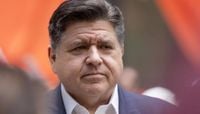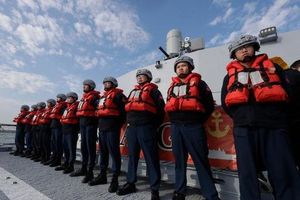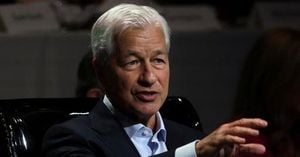The political temperature in Illinois soared this week after President Donald Trump called for the jailing of Governor JB Pritzker and Chicago Mayor Brandon Johnson, accusing them of failing to protect Immigration and Customs Enforcement (ICE) officers amid a contentious federal crackdown on immigration in the city. The president’s remarks, made on October 8, 2025, via Truth Social, have drawn fierce rebukes from both Illinois leaders and sparked a broader national conversation about the use of federal power, the deployment of troops in American cities, and the boundaries of political rhetoric.
Trump’s post, which read, "Chicago Mayor should be in jail for failing to protect ICE Officers! Governor Pritzker also!", came on the heels of escalating confrontations between federal authorities and local officials in Chicago. According to Capitol News Illinois, the president’s statement marked a sharp escalation in his ongoing feud with Democratic leaders in Illinois, who have been vocal in their opposition to the Trump administration’s immigration enforcement tactics and military deployments.
Neither Pritzker nor Johnson has been accused of any crime related to the president’s claims. As Axios and Politico both emphasized, Trump’s call for their imprisonment is not based on any formal charges, but rather on his perception of their resistance to federal immigration enforcement efforts. In fact, both Illinois leaders have actively opposed the deployment of federalized National Guard troops to Chicago, a stance that has put them at odds with the White House’s more aggressive approach.
The backdrop to this war of words is a series of dramatic developments on the ground. On October 7, 2025, Texas National Guard troops arrived in the Chicago area, with an additional 300 Illinois National Guard members authorized for deployment by Secretary of Defense Pete Hegseth just days earlier. This surge in federal presence is part of the Trump administration’s "Operation Midway Blitz," an initiative aimed at detaining undocumented immigrants in the Chicago area. The operation has already resulted in a number of chaotic and sometimes violent clashes between protesters and federal agents, particularly outside an ICE facility in a Chicago suburb.
Chicago Mayor Brandon Johnson, for his part, has taken steps to limit federal authority within the city. On October 6, 2025, Johnson signed an "ICE Free Zone" order, restricting federal authorities from using city property for civil immigration enforcement. This move, which the White House described as a “disgusting betrayal,” was intended to signal Chicago’s commitment to protecting its immigrant community and resisting what local officials view as federal overreach.
Governor Pritzker responded to Trump’s call for his arrest with characteristic defiance. "If you come for my people, you come through me. So come and get me," he declared during a news conference outside the federal building in downtown Chicago on October 8, 2025, as reported by Politico. Pritzker went further, characterizing Trump as “unhinged” and a “wannabe dictator,” and urged Illinois residents to document federal actions on the ground. "We want everybody to pull out their phones and the Android, iPhone, whatever you’ve got, and film everything you see, because we take that to court, and we also show it to the whole public," he said.
Mayor Johnson, too, was blunt in his response. "This is not the first time Trump has tried to have a Black man unjustly arrested. I’m not going anywhere," he wrote, referencing the president’s history of targeting political opponents, particularly those from minority backgrounds. Johnson’s remarks, covered by Axios and ABC News, underscore the racial and political dynamics at play in this high-profile confrontation.
The situation in Chicago has not gone unnoticed by the courts. On October 6, 2025, the state of Illinois filed a lawsuit seeking to block the deployment of federal troops to the city, following a federal judge in Oregon’s decision to twice rule against similar efforts in Portland. The Trump administration has appealed those decisions and has openly discussed the possibility of invoking the Insurrection Act if governors and mayors continue to resist federal troop deployments.
Meanwhile, the increased presence of ICE and National Guard troops in Chicago has led to a series of protests and, in some cases, violent confrontations. On October 7, 2025, a coalition of demonstrators, local journalists, nonprofits, and unions filed a lawsuit against the Trump administration, alleging that law enforcement had violated their First Amendment rights by using “extreme brutality” during protests. Department of Homeland Security Secretary Kristi Noem further inflamed tensions by describing Chicago as a “war zone,” a characterization that Governor Pritzker forcefully rejected, stating, “They are the ones that are making it a war zone.”
Trump’s penchant for calling for the imprisonment of his political adversaries is nothing new. Over the years, he has repeatedly targeted his opponents, from Hillary Clinton to Kamala Harris, with chants of "lock her up" and similar rhetoric. In recent weeks, the Department of Justice has even acted on some of these calls, with former FBI Director James Comey facing federal charges for allegedly lying to Congress. Trump has also urged Attorney General Pam Bondi to pursue cases against other high-profile Democrats, such as Senator Adam Schiff and New York Attorney General Letitia James.
The current standoff in Chicago is just the latest flashpoint in a broader national debate over the limits of federal authority, the use of military force in domestic affairs, and the health of American democracy. Governor Pritzker and California Governor Gavin Newsom have even threatened to pull their states out of the National Governor’s Association if it does not do more to oppose Trump’s cross-state National Guard deployments, signaling a deepening rift between the White House and Democratic-led states.
For many observers, the events of this week in Illinois are emblematic of the polarized and often volatile state of American politics in 2025. As the legal battles unfold and federal troops remain on the streets of Chicago, the nation watches closely, wondering what comes next in this extraordinary confrontation between state and federal power.
With both sides digging in their heels, and with the courts now involved, the outcome of this latest clash remains uncertain. But one thing is clear: the fight over immigration enforcement, the role of federal troops, and the rhetoric used by those in power has thrust Illinois—and the nation—into uncharted territory.





